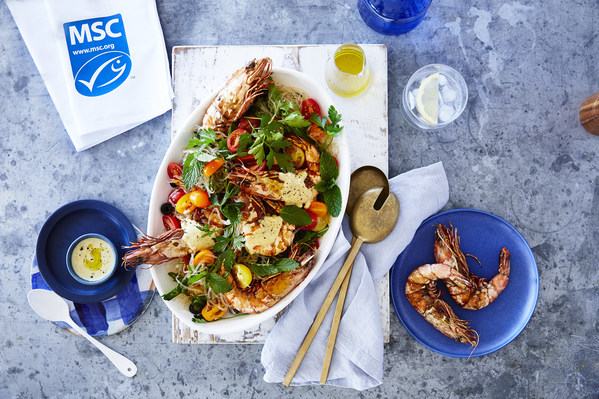SYDNEY, Dec. 20, 2022 /PRNewswire/ -- The Marine Stewardship Council (MSC), a non-profit that sets a global standard for sustainable fishing, has commissioned new research through YouGov* to make head and tail of Australia's love of prawns, and how we can best enjoy them sustainably.

Look for the MSC blue fish tick label to ensure your Christmas prawns come from a certified sustainable fishery
Prawns are set to take centre stage again this festive season, with 55% of Australians surveyed ranking prawns the most essential ingredient for an Aussie Christmas.
Australians typically tuck into around 22,000 tonnes of prawns** during the festive period, the equivalent of 10 Olympic sized swimming pools full of prawns. That's estimated to be 40% of our annual prawn consumption.
The survey revealed that 5 million Australians are planning to enjoy even MORE prawns this Christmas compared to last year. This is largely driven by the desire to eat better quality food (48%), support local food producers (38%), and eat more food from sustainable sources (37%). Only 11% (2.2 million) are planning to eat less prawns this Christmas.
With almost 3 million Australians eating MORE rather than less prawns this Christmas ensuring a sustainable supply of prawns is more important than ever before. In total, 16.7 million Australians plan to indulge in prawns over the festive season. Of these, 10.3 million Australians plan to buy MSC certified sustainable prawns this Christmas, motivated by supporting local fishing communities (39%), safeguarding seafood for future generations (35%), and minimising the environmental impact of their Christmas feast (28%).
Anne Gabriel, Oceania Program Director at the MSC, provided an upbeat assessment: "Aussies care about where their seafood comes from and overwhelmingly support sustainable fishing practices. Christmas is a great time to turn that wish into action. With over half of Australian wild-caught prawns MSC certified as sustainable, there is plenty to choose from just by looking for the MSC blue fish tick. Afterall, at this time of giving, when we look after the ocean, the ocean looks after us.".
Which prawns are certified sustainable?
Australia's MSC certified prawn fisheries go above and beyond, investing in world-leading innovations to reduce their bycatch, have catch limits based on scientific data all of which is underpinned by responsible management practices. Shoppers are advised to look for the MSC blue fish tick label, which indicate seafood from an MSC certified sustainable fishery.
Speaking about prawns at Christmas, chef Courtney Roulston says: "There's nothing more Aussie than prawns at Christmas. They're delicious, quick, and easy to prepare and can be enjoyed in a wide variety of ways. As a chef, I want to know where my food comes from. It can't get better than knowing your prawns are Australian, wild-caught and MSC certified sustainable. Here's to a fabulous summer full of joy and cheer."
For more information on MSC certified sustainable prawns, head to msc.org/christmas
About the research:
About the Marine Stewardship Council:
The Marine Stewardship Council (MSC) is an international non-profit on a mission to end overfishing that set standards for sustainable fishing and assurance within the seafood supply chain.
Overfishing is a major global challenge that threatens ocean wildlife, livelihoods, and seafood for future generations.
The MSC makes shopping for sustainable seafood easy. Just look for the MSC blue fish tick label on a wide range of wild-caught seafood products available at your local supermarket.